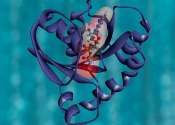Discovering water's role within a protein
A team of researchers from Case Western Reserve University has identified a way to probe water molecules deep inside proteins, exposing a communication network mobilized when proteins are turned "on."

A team of researchers from Case Western Reserve University has identified a way to probe water molecules deep inside proteins, exposing a communication network mobilized when proteins are turned "on."
Cell & Microbiology
Nov 3, 2010
0
0

Researchers in Germany identified the precise structural differences that determine if a protein becomes an active enzyme or an iron scaffold. This finding, reported in Nature Communications, provides deeper insight into ...
Cell & Microbiology
Apr 22, 2020
0
38
An antibiotic known for its immunosuppressive functions could also point the way to the development of new anti-cancer agents, researchers at the Indiana University School of Medicine have reported.
Biochemistry
Jan 28, 2011
0
0

By studying more than 50,000 variants of a jellyfish gene, researchers at the Centre for Genomic Regulation in Barcelona (Spain) have drawn a detailed picture of how changes in that gene affect its function. The study, carried ...
Biotechnology
May 12, 2016
0
13

The p53 protein protects our cells from cancer and is an interesting target for cancer treatments. The problem is, however, that it breaks down rapidly in the cell. Researchers at Karolinska Institutet in Sweden have now ...
Biochemistry
Mar 14, 2022
0
348
Northwestern Medicine scientists have identified a component of the herpesvirus that "hijacks" machinery inside human cells, allowing the virus to rapidly and successfully invade the nervous system upon initial exposure.
Cell & Microbiology
Mar 28, 2013
0
0

Reducing naturally occurring errors in protein synthesis (production) improves both health and lifespan, finds a new study in simple model organisms led by researchers at UCL and MRC London Institute of Medical Sciences.
Cell & Microbiology
Sep 14, 2021
0
262

Scientists have developed a CRISPR gene-editing technique that can potentially correct a majority of the 3,000 mutations that cause Duchenne muscular dystrophy (DMD) by making a single cut at strategic points along the patient's ...
Biotechnology
Feb 6, 2018
0
65

The idea of irreversible inhibitors adhering permanently to a target protein has gained increasing attention for application in potential drug development. However, one of many hurdles is the possibility of protein mutations ...
Biochemistry
Nov 29, 2023
0
20

Nothing works without proteins in the body, they are the molecular all-rounders in our cells. If they do not work properly, severe diseases, such as Alzheimer's, may result. To develop methods to repair malfunctioning proteins, ...
Biotechnology
Mar 24, 2017
0
19